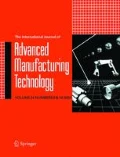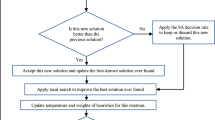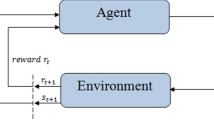Abstract
A new scheduling model in which both two-agent and position-dependent processing times exist simultaneously is considered in this paper. Two agents compete to perform their respective jobs on a common single machine, and each agent has his own criterion to optimize. The job position-dependent processing time is characterized by increasing or decreasing function dependent on the position of a job in the sequence. We introduce an aging effect and a learning effect into the two-agent single-machine scheduling, where the objective is to minimize the total completion time of the first agent with the restriction that the maximum cost of the second agent cannot exceed a given upper bound. We propose the optimal properties for the considered scheduling problems and then present the optimal polynomial time algorithms to solve the two scheduling problems, respectively.
Similar content being viewed by others
References
Agnetis A, Mirchandani PB, Pacciarelli D, Pacifici A (2004) Scheduling problems with two competing agents. Oper Res 52:229–242
Ng CT, Cheng TCE, Yuan JJ (2006) A note on the complexity of the problem of two-agent scheduling on a single machine. J Comb Optim 12:387–394
Cheng TCE, Ng CT, Yuan JJ (2006) Multi-agent scheduling on a single machine to minimize total weighted number of tardy jobs. Theor Comput Sci 362:273–281
Agnetis A, Pacciarelli D, Pacifici A (2007) Multi-agent single machine scheduling. Ann Oper Res 150:3–15
Cheng TCE, Ng CT, Yuan JJ (2008) Multi-agent scheduling on a single machine with max-form criteria. Eur J Oper Res 188:603–609
Baker KR, Smith JC (2003) A multiple-criterion model for machine scheduling. J Sched 6:7–16
Yuan JJ, Shang WP, Feng Q (2005) A note on the scheduling with two families of jobs. J Sched 8:537–542
Agnetis A, Pascale G, Pacciarelli D (2009) A Lagrangian approach to single-machine scheduling problems with two competing agents. J Sched 12:401–415
Liu P, Tang LX (2008) Two-agent scheduling with linear deteriorating jobs on a single machine. Lect Notes Comput Sci 5092:642–650
Biskup D (1999) Single-machine scheduling with learning considerations. Eur J Oper Res 115:173–178
Mosheiov G (2001) Scheduling problems with a learning effect. Eur J Oper Res 132:687–693
Mosheiov G (2001) Parallel machine scheduling with a learning effect. J Oper Res Soc 52:1165–1169
Cheng TCE, Wang G (2000) Single machine scheduling with learning effect considerations. Ann Oper Res 98:273–290
Bachman A, Janiak A (2004) Scheduling jobs with position-dependent processing times. J Oper Res Soc 55:257–264
Wang JB, Xia ZQ (2005) Flowshop scheduling with a learning effect. J Oper Res Soc 56:1325–1330
Wu CC, Lee WC, Wang WC (2007) A two-machine flowshop maximum tardiness scheduling problem with a learning effect. Int J Adv Manuf Tech 31:743–750
Wu CC, Lee WC (2007) A note on single-machine scheduling with learning effect and an availability constraint. Int J Adv Manuf Tech 33:540–544
Wang JB (2008) Single-machine scheduling with general learning functions. Comput Math Appl 56:1941–1947
Wang JB, Wang LY, Wang D, Wang XY, Guo WJ, Yin N (2009) Single machine scheduling problems with position-dependent processing times. J Appl Math Comput 30:293–304
Eren T, Guner E (2009) A bicriteria parallel machine scheduling with a learning effect. Int J Adv Manuf Tech 40:1202–1205
Wang JB, Jiang Y, Wang G (2009) Single-machine scheduling with past-sequence-dependent setup times and effects of deterioration and learning. Int J Adv Manuf Tech 41:1221–1226
Wang LY, Wang JB, Wang D, Yin N, Huang X, Feng EM (2009) Single-machine scheduling with a sum-of-processing-time-based learning effect and deteriorating jobs. Int J Adv Manuf Technol. doi:10.1007/s00170-009-1950-X
Badiru AB (1992) Computational survey of univariate and multivariate learning curve models. IEEE Trans Eng Manage 39:176–188
Biskup D (2008) A state-of-the-art review on scheduling with learning effects. Eur J Oper Res 188:315–329
Mosheiov G (2005) A note on scheduling deteriorating jobs. Math Comput Model 41:883–886
Zhao CL, Tang HY (2007) Single-machine scheduling problems with an aging effect. J Appl Math Comput 25:305–314
Kuo WH, Yang DL (2008) Minimizing the makespan in a single-machine scheduling problem with the cyclic process of an aging effect. J Oper Res Soc 59:416–420
Chang PC, Chen SH, Mani V (2009) A note on due-date assignment and single machine scheduling with a learning/aging effect. Int J Prod Econ 117:142–149
Graham RL, Lawler EL, Lenstra JK, Rinnooy Kan AHG (1979) Optimization and approximation in deterministic sequencing and scheduling theory: a survey. Ann Discrete Math 5:287–326
Author information
Authors and Affiliations
Corresponding author
Rights and permissions
About this article
Cite this article
Liu, P., Zhou, X. & Tang, L. Two-agent single-machine scheduling with position-dependent processing times. Int J Adv Manuf Technol 48, 325–331 (2010). https://doi.org/10.1007/s00170-009-2259-5
Received:
Accepted:
Published:
Issue Date:
DOI: https://doi.org/10.1007/s00170-009-2259-5




